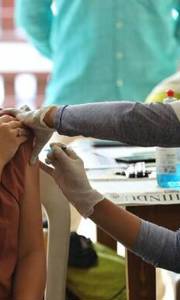
Right time to get your booster dose? It’s now
Posted 08 Jul 2022 | Source: bangaloremirror.indiatimes.com
City docs welcome reduction in gap between second dose and booster shot to help increase vax coverage among people in wake of rising covid cases
In an attempt to ramp up booster dose coverage in the light of rising covid cases, the Union Health Ministry has decided to reduce the duration of the booster dose from nine months to six months. This will make it easier for peoAs the third wave of omicron strain had been mild, many individuals started to take it easy and the demand for booster shots has been low. In spite of the stocks available in the hospitals, there are no takers.ple to take their booster shots and increase vaccine coverage, according to health professionals.
The Union Ministry on Wednesday stated, “In the view of evolving scientific evidence and global practices, Standing Technical Sub Committee” (STSC) of ‘National Technical Advisory Group on Immunisation’ (NTAGI) has recommended to revise the duration between the 2nd dose and precaution dose from existing 9 months or 39 weeks to 6 months or 26 weeks. This has also been endorsed by NTAGI.
With covid cases increasing, according to World Health Organisation (WHO), globally there has been rise in covid-19 infections by nearly 30% per cent over the past two weeks.
The WHO chief had stated that delay in testing and lack of encouragement to take the booster dose were the key reasons for the current global surge.
With the concerns regarding the new strains of the virus and the new identified variant of omicron BA 2.75 detected in many states in India and even other countries, it has raised alarms once more.
While it is not yet known if it is more severe of transmissibility is high, taking precautions is a must, added the health professionals.
Dr.Aditya Chowti, Senior Consultant, Internal Medicine, Fortis Hospital , Cunningham Road, pointed out that it was a good move to reduce the duration of booster vaccination as cases have been rising again. “The newer lineages of virus seem to be infectious. The symptoms are of upper respiratory tract infections. Time and again, vaccinations have shown that it can reduce the severity and it is important to get the vaccines for every individual.”
"No matter what the strain is, we need to develop our immunity and booster doses will help do that"
– Dr SN Aravinda, Aster RV Hospital
Overall, in the state, of the 5,39,76,440 people vaccinated with two doses, only 36,97,990 have taken booster shots.
Healthcare workers who were the first in line to get vaccinated are yet to take booster doses. Out of the 7,62,210 healthcare workers who have taken their second doses, only 4,76,354 have taken booster doses. Similarly, in the case of frontline workers, out of 9,45,755 individuals inoculated with the second doses, only 4,61,644 have taken their precautionary doses.
Dr Swati Rajagopal, Consultant, Infectious Disease & Travel Medicine, Aster CMI Hospital said, “The variants certainly carry the risk of increased infectivity and hence spread fast. Hence vaccinations, with re-enforcement of basic practices like distancing and masks are important. Vaccines with the primary two doses with booster reduce the chances of hospitalisation and severity of infection.”
Dr SN Aravinda, Consultant, Internal Medicine, Aster RV Hospital, pointed out that cases have increased slightly but people are seen recovering in two-three days with home isolation and hospital admissions have not increased yet.
He added, “No matter what the strain is, we need to develop immunity and booster doses will help to do that.”
